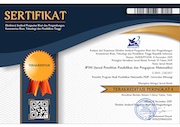Pengembangan CAI-kontekstual untuk meningkatkan kemampuan berpikir matematik dan karakter mahasiswa
Abstract
This research was the development of mathematical learning model to improve students’ mathematical thinking and characters. The model developed was Computer Assisted Instruction (CAI) – Contextual in the course of mathematics capita selecta of high school. The research used research and development method through ‘thought experiments’ and ‘instruction experiments’ with a cyclical process. Subjects in this study were students of mathematics teacher education of STKIP Garut, consisted of three classes. The instruments developed were documentation study, interview guides for students, mathematical thinking ability tests and questionnaires to measure the student’s character. Based on the results achieved, it can be concluded: (1) There were a potential and opportunities that exist in the field to develop the components of CAI-Contextual, (2) CAI-Contextual potentials to improve students’ mathematical thinking and characters, and (3) Students’ mathematical thinking and characters increases on the average and the students have a good character.
Full Text:
view PDFReferences
Asifudin, AF. (2015). Mendesaknya Pendidikan Adab. Majalah As-Sunah, Edisi 08 Shafar 1437H Desember 2015M Tahun XIX.
Atun, I. (2006). Pembelajaran Matematika dengan Strategi Kooperatif Tipe Student Teams Achievement Divisions untuk Meningkatkan Kemampuan Pemecahan Masalah dan Komunikasi Siswa SMA. Bandung: Tesis pada SPs UPI: tidak diterbitkan.
Biryukov, P. (2003). Metacognitive Aspects of Solving Combinatorics Problems. Berr-Sheva: Kaye College of Education.
Borg, W.R.& Gall, M.D. (1979).EducationalResearch: An introduction.NewYork & London: Longman.
BPP Puskur (2010). Pengembangan Pendidikan Budaya dan Karakter Bangsa: Bahan Pelatihan Penguatan Metodologi Pembelajaran Berdasarkan Nilai-nilai Budaya untuk Membentuk Daya Saing dan Karakter Bangsa. Jakarta: Kementrian Pendidikan Nasional.
Darmawan, D. (2010). Pemrograman Pembelajaran Berbasis Computer Assisted Instruction. Bandung: PT Remaja Rosdakarya.
Dimyati & Mudjiono (2002). Belajar dan Pembelajaran. Jakarta: Rineka Cipta.
Driver, R. (1993). A Constructivist View of Learning: Children’s Conceptions and Nature of Science. In What Research Says to theSciences Teacher. Washington: National Sciences TeacherAsosiation.
Kemendikbud (2011). Survey Internasional TIMSS (trends In International Mathematics and Science Study. Jakarta: Badan Penelitian dan Pengembangan.
Kesuma, D. Dkk. (2011). Pendidikan Karakter: Kajian Teori dan Praktik di Sekolah. Bandung: PT. Remaja Rosda Karya.
Mujib, A. (2011). Analisis Penalaran dalam Ujian Nasional Matematika SMA/MA Program IPA Tahun Pelajaran 2011/2012. Laporan Akhir Penelitian. Universitas Muslim Nusantara (UMN) Al-Washliyah.
NCTM (2000). Principles and Standard for School Mathematics. Reston, VA: NCTM.
Ruseffendi, E.T. (1991). Pengantar kepada Membantu Guru Mengembangkan Kompetensinya dalam Pengajaran Matematika untuk Meningkatkan CBSA. Bandung : Tarsito.
Sabandar, J. (2007). Berpikir Reflektif. Makalah pada Seminar Tingkat Nasional FPMIPA UPI Bandung: tidak diterbitkan.
Schoenfeld, A.H. (1992). „Learning to Think Mathematically: Problem Solving, Metacognition, and Sense Making in Mathematicsâ€. Handbook of Research on Mathematics Teaching and Learning. New York: Macmillan Publishing Company.
Silver, E.A. (1997). Fostering Creativity through Instruction Rich in Mathematical Problem Solving and Problem Posing. [Online]. Tersedia:http://66.102.7.104/ search?q=cache:Fw8Lg-xQoFwJ:www.fiz-karlsruhe.de/fiz. [Oktober 2007].
Soedjadi, R. (1994). Deduktif-Aksiomatik. Surabaya: IKIP Surabaya.
Sugiyono (2009).Metode Penelitian Kuantitatif dan Kualitatif. Bandung: CV.Alfabeta.
Suherman, E. dkk. (2001). Strategi Pembelajaran Matematika Kontemporer. Bandung: JICA, FPMIPA UPI.
Sumarmo, U. (1987). Kemampuan Pemahaman dan Penalaran Matematika Siswa SMA Dikaitkan dengan Kemampuan Penalaran Logik Siswa dan Beberapa Unsur Proses Belajar-Mengajar. Disertasi Doktor pada FPS IKIP Bandung: tidak diterbitkan.
Sumarmo, U. (2003). “Pembelajaran Matematika untuk Mendukung Pelaksanaan Kurikulum Berbasis Kompetensi“.Makalah pada Pelatihan Guru Matematika, Jurusan Matematika ITB, Bandung.
Yaniawati, R.P. (2010). e-Learning: Alternatif Pembelajaran Kontemporer. Bandung: Arfino Raya.
DOI: https://doi.org/10.37058/jp3m.v2i2.164
Refbacks
- There are currently no refbacks.
©2017 JP3M (Jurnal Penelitian Pendidikan dan Pengajaran Matematika)
Program Studi Pendidikan Matematika
Fakultas Keguruan dan Ilmu PendidikanÂ
Universitas Siliwangi
Jl. Siliwangi No. 24 Kota Tasikmalaya - 46115
email: jp3m@unsil.ac.id
e-ISSN: 2581-2807 ; p-ISSN: 2460-8599

This work is licensed under a Creative Commons Attribution-NonCommercial-ShareAlike 4.0 International License.
StatCounter:
Detail


